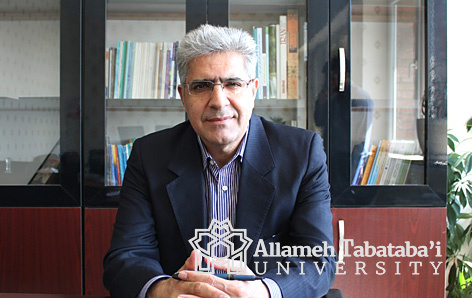Friday, 17 April 2020
Ahmadvand answers questions on academic activities during COVID-19

Directorate for International Academic Cooperation__
Following the lockdowns and limitation in academic and other activities, ATU's Vice-president for Education answered to a number of questions regarding the university's current activities.
In an interview ATU's PR had with the university's Vice-President for Education, Dr Shoja Ahmadvand answered to a number of key questions regarding the academic activities in ATU during the COVID-19 limitations. In what follows, you can read the questions and answers.
Q. Given the set-up and opening of the university's virtual learning platform, are students still able to drop course(s)?
As we are suffering a severe global pandemic, the opening and use of virtual learning platforms is not an option; it is a must. As there is no guaranteed time for the end of pandemic, we have to adopt ourselves to the current situation. In a recent report from Bloomberg, I read that only 30 per cent of the US teachers have so far experienced virtual teaching, and the rest are not familiar with this method. Therefore, this is a global challenge. However, the evidence shows that our talented lecturers are more and more becoming proficient in using the online platform and sometimes show innovations which were not possible in offline classes. On the other hand, dropping semester courses altogether should have negative consequences for the academic community. Notwithstanding all these, three groups of students could drop courses: (1) those who do not have access to quality internet services; (2) those students who, either themselves or one of their family members, are afflicted with COVID-19 or other severe illnesses; (3) those students who have taken "applied" courses and the organisation of the course be not possible on virtual platforms. Only in these three situations, ATU students could apply for dropping their semester courses.
Q. Postgraduate students need to have access to library resources and have to keep contact with professors. What should they do?
The university's Central Library and Documentation Centre is prepared to provide access to students and other members through its Virtual Service Desks. In terms of the physical presence of PhD students, following the Ministry of Science, Research and Technology's decision, the universities can allow PhD students to enter the universities since 20 April, provided that all necessary health conditions are met in contacts. Again, high emphasis has been laid on the use of virtual and electronic platforms for holding the theoretical courses. In this sitution, if a student might need more time to finish their theses / dissertations, we should certainly facilitate the process as far as we could.
Q. Will the tuition-paying students (Shabaneh Programmes) receive discounts for the difference occurred in their course methods?
As the Shabaneh students have paid a tuition for the physical courses and they are now receiving another type of service, we have provided positive suggestions to the university's Board of Trustees and we are waiting for their reply. If they might consent, we should acknowledge the result immediately.
Q. How the university helps students in accessing the online platforms?
With the help of the Ministry of Communications, all users, including students and professors, have access to the online learning platforms with free internet traffic. This is a very important news and removes the barriers in the users' access to online platforms.
Q. How will the final exams be held?
We are analysing this topic but, given the current state of affairs, the finals exams should also be held online probably.
Q. How should the students' presence or absence be monitored in the online platform?
It will be mainly done by teachers. They will monitor the students' presence and participation in classes, and should be informed in case a student might have difficulty in connecting to and participating in the online class. Therefore, the Vice-Presidency for Education relies on the teachers' lists of present / absent students.
Q. What if a student has just two or three courses to graduate? What should they do?
According to the bylaws, if a student has only two courses to graduate, they do not need to pass a full semester; they could take those two courses during summer and only sit the exam to pass the courses. However, given the Pandemic, we have increased the number of courses by 100 per cent, and students who have 4 courses remaining before they could graduate are able to follow the same process and apply for the same regulation.
Q. Are Tuition-Paying (Shabaneh) students able to enjoy an academic leave without having to pay the tuition?
Academic leaves are subject to regulations passed and available to all members in the bylaws. Should a student have the conditions, they could apply for the leave. All applications will be raised in relevant commissions. Applications which are not eligible should be rejected, but the applications submitted complying with the regulations have the chance to be approved in the commissions.


